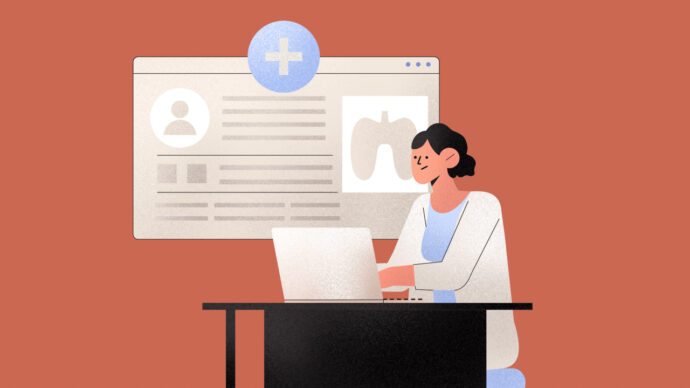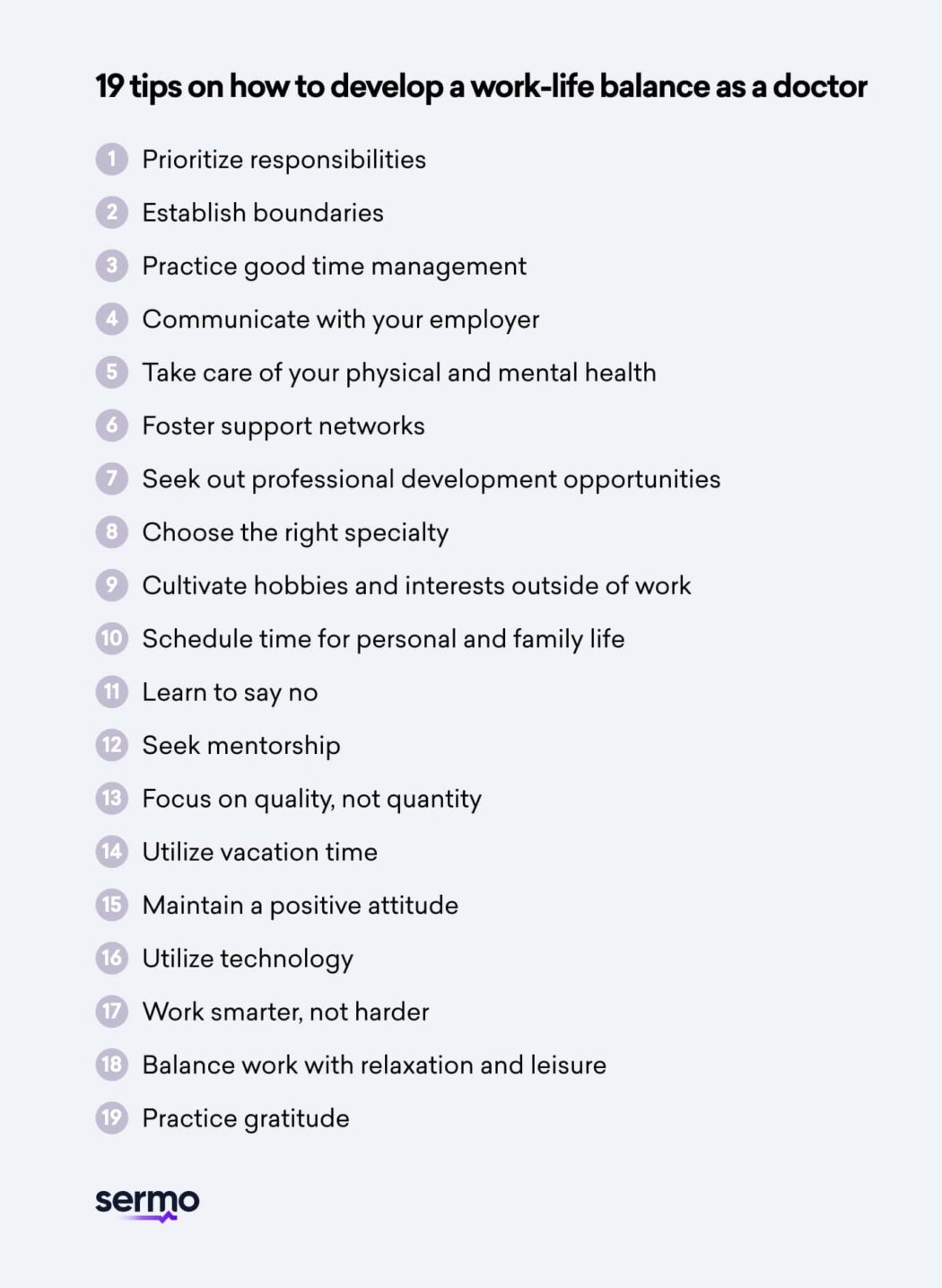
The demanding nature of the medical profession often leads to long hours, high stress, and a challenging work environment. These factors can take a toll on doctors’ mental and physical well-being, making it increasingly important for them to find a healthy work-life balance. According to a Sermo survey, 63% of physicians believe they are doing a good job maintaining a work-life balance as a doctor, while 37% state that they are not doing a good job with it. But ultimately, the happiest doctors are those who weigh up a range of factors to gain the best overall work/life balance and job satisfaction. If your priority is work life balance, medicine is not typically the easiest field, but there are ways you can set yourself up for success. A rising number of physicians are opting for part-time roles, citing reasons ranging from work-life balance to the pursuit of personal interests or entrepreneurial ventures.
Achieving this doctor work life balance is not only crucial for personal happiness and health but also contributes to better patient care, reduced burnout, and overall job satisfaction. Work life balance as a doctor is a crucial aspect of a physician’s career. With the high-stress nature of the job, doctors often struggle to balance their personal and professional responsibilities. Recent studies suggest that the physician’s specialty may play a significant role in determining the doctor with best work life balance. In this article, we discuss the importance of doctor work life balance and provide a time-saving guide on best practices to achieve this physician work life balance in your professional life.

Importance of work-life balance for doctors
Work-life balance refers to the equilibrium between the time and energy dedicated to work and personal life, including family, friends, and hobbies. For physicians, finding a good doctor work life balance can be particularly challenging due to the demanding nature of their profession. However, achieving a healthy work-life balance is essential for various reasons:
1. Mental health
A general practice doctor in the U.K. stated in a recent Sermo conversation that “Yes it is very difficult to maintain balance between work and family life. Balance needs to be maintained so as not to tilt a doctor to mental illness and stress. Most of the time, with sufficient staffing, less work will be covered by an individual, call dates will not come so quickly and doctors will have their lives to live and have stress free and less exhaustive jobs”.
A study1 found that physicians are at a higher risk of burnout, depression, and suicide than the general population. Achieving a healthy work-life balance can help reduce stress and the risk of mental health issues. A separate survey revealed that 42% of physicians reported burnout, with over a third of respondents attributing it to excessive workloads and long hours. These factors are integral in understanding the importance of work life balance medicine. By striking a balanced doctor work schedule, doctors can effectively reduce stress and decrease the risk of mental health issues.
2. Reducing burnout
Burnout is a significant concern in the medical profession, as it can lead to decreased job satisfaction, increased medical errors, and a higher likelihood of leaving the profession. This cycle is intensifying workloads for those who remain, with 37% of physicians struggling to achieve work-life balance and 67% saying their clinics could do more to support it. By finding a work-life balance, doctors can reduce the risk of burnout and maintain their passion for their profession. The World Health Organization (WHO) recognizes burnout as an occupational phenomenon, emphasizing the need for a healthy work-life balance among physicians.

3. Job satisfaction
A better work-life balance can lead to increased job satisfaction for physicians, which can have a positive impact on their overall well-being and career longevity. A study published in the Journal of General Internal Medicine found that physicians who reported a healthy work-life balance were more likely to be satisfied with their career and less likely to leave the medical profession.
4. Enhanced job performance
Physicians who maintain a healthy balance between their work and personal lives are more likely to be engaged, focused, and productive at work, ultimately leading to better patient care. A study in the Journal of Applied Psychology found that work-life balance is positively correlated with job performance and organizational commitment.
5. Personal well-being
A balanced lifestyle allows physicians to spend quality time with their families, engage in hobbies and interests, and maintain a healthy social life. This balance contributes to overall happiness and well-being, fostering resilience against stress and burnout.
6. Patient care
A healthy work-life balance allows physicians to maintain their mental and emotional well-being, leading to improved patient care. Research shows that physician burnout is associated with increased medical errors and lower patient satisfaction. By achieving a healthy balance, physicians can provide better care to their patients and improve overall healthcare outcomes.
How to maintain work-life balance as a doctor
To achieve a healthy work-life balance, physicians can consider implementing the following best practices:
1. Prioritize responsibilities
Identify and focus on the most critical tasks at work and delegate or eliminate less essential tasks when possible. This approach helps manage workload and reduce stress. Physicians should also prioritize their personal life, ensuring that they allocate time for family, friends, and self-care.
2. Establish boundaries at work
In a recent Sermo survey, a U.S. Cardiologist stated as a remedy to work-life balance, “Set boundaries: Establish clear boundaries between work and personal life. For example, avoid checking work emails or answering work-related calls during off-hours, and schedule personal time on your calendar. Take breaks: Take regular breaks throughout the day to rest and recharge– simply stepping away from work for a few minutes. Prioritize self-care: Make time for self-care activities that help you relax and unwind, such as exercise, meditation, or hobbies. Delegate tasks: Delegate tasks that can be handled by others to free up time for more important responsibilities. Seek support: Having a strong support system can help reduce stress and improve overall well-being.”
Set limits on work hours and avoid taking work home when possible to ensure you have the mental and emotional space needed to recharge. It’s essential to communicate these boundaries to colleagues, family, and friends, so they understand and respect your need for personal time.
3. Practice good time management
According to a Sermo survey, 45% of physicians indicated that their doctor work schedule was their biggest challenge in regards to maintaining work-life balance. Effective time management skills can help physicians make the most of their work hours and free up time for personal activities. This can include setting goals, prioritizing tasks, and using tools like calendars and to-do lists to stay organized. Physicians can also consider utilizing time-saving technologies, such as electronic medical records and telemedicine, to streamline work processes.

4. Communicate with your employer
Discuss work-life balance concerns with your employer and explore possible solutions, such as flexible work hours, telemedicine opportunities, or job-sharing arrangements. Open communication can help identify potential changes that can improve your work-life balance.
5. Take care of your physical and mental health
A Sermo physician who is a psychiatrist in Italy aptly said in response to questions about how to achieve work-life balance “Personally I am trying to do my best. Physical training early in the morning in order to preserve time spent with family for instance is a good, but demanding, strategy. I am trying not to fill entirely my private practice agenda even at the cost of reducing earnings a little bit. And lots of consciousness to live the best I can, the little but good time with family and friends”.
Prioritize self-care by engaging in regular exercise, eating a balanced diet, getting enough sleep, and seeking professional help if needed. A healthy body and mind can better cope with the demands of the medical profession. Physicians can also consider incorporating mindfulness practices, such as meditation and deep breathing exercises, to help manage stress and maintain mental clarity.
6. Foster support networks
Develop and maintain relationships with colleagues, friends, and family who can provide emotional support and understanding. This network can be invaluable in managing stress and maintaining a healthy work-life balance. Joining professional associations and online communities, such as the physician social network Sermo, can provide valuable connections and resources.
7. Seek out professional development opportunities
Continuous learning and professional growth can help physicians stay engaged and passionate about their work. Attend conferences, participate in workshops, and join professional associations to expand your knowledge and skills. Pursuing additional certifications or degrees can also enhance your career and contribute to a sense of personal accomplishment.
8. Choose the right specialty
Some medical specialties with best work life balance offer a better situation than others. Research and consider choosing a specialty that aligns with your desired work-life balance, such as family medicine, dermatology, or psychiatry. For instance, a survey found that doctors with best work life balance in these specialities reported higher levels of work-life balance satisfaction compared to those in more demanding specialties.
9. Cultivate hobbies and interests outside of work
Engaging in activities outside of the medical profession can help physicians maintain a well-rounded lifestyle and provide an outlet for stress relief. This can include hobbies like gardening, painting, or playing a musical instrument, as well as physical activities like yoga, running, or cycling. If you want to make an impact on medical research while running or walking, check out the annual Run With Peter.
10. Schedule time for personal and family life
Proactively schedule time for personal and family activities, just as you would for work-related tasks. This can include setting aside dedicated time for family dinners, date nights, or vacations. By prioritizing personal time, physicians, such as pediatricians trying to strike a good pediatrician work life balance, can ensure that they maintain a healthy balance between their professional and personal lives
11. Learn to say no
Sometimes, it’s necessary to decline additional responsibilities or engagements to maintain a healthy work-life balance. While it can be challenging, especially for physicians who are dedicated to their profession, learning to say no when needed can prevent becoming overwhelmed and overworked.

12. Seek mentorship
Connecting with experienced physicians who have successfully achieved a work-life balance can provide valuable guidance and advice. Seek out mentors within your professional network, or join online communities to find peers who can share their insights and experiences.
13. Focus on quality, not quantity
Strive to make the most of the time you spend at work by focusing on providing high-quality care to your patients. By concentrating on quality, physicians can feel a greater sense of accomplishment and satisfaction in their work, contributing to a healthier work-life balance.
14. Utilize vacation time
Take advantage of vacation time to recharge and rejuvenate. Physicians who take regular breaks from work can return to their practice feeling refreshed and more capable of maintaining a healthy work-life balance.
15. Maintain a positive attitude
Cultivating a positive mindset can help physicians cope with the challenges of their profession and maintain a healthy work-life balance. Focus on the rewarding aspects of your work, such as helping patients and making a difference in their lives. This positive outlook can help reduce stress and improve overall well-being.
16. Utilize technology
Embrace technology that can streamline your work processes and save time. Electronic health records, telemedicine, and digital communication tools can help physicians manage their workload more efficiently and free up time for personal activities. Generative AI brings the potential to automate a wider range of tasks than previously possible.
As it’s still new technology for individuals, the opportunities to use AI to be more efficient with your time are still being developed. It’s a good time to experiment with Chat GPT and other AI models to see the capabilities for yourself. Maybe trying different prompts for 30 minutes could unlock a new process that saves you hours of your time every week.
17. Work smarter, not harder
Identify ways to improve efficiency in your daily work routine. This can include optimizing patient scheduling, delegating tasks to support staff, or streamlining administrative processes. By working smarter, physicians can make the most of their work hours and create more time for personal life.
18. Balance work with relaxation and leisure
Ensure that your personal life includes activities that help you relax and unwind. Engaging in leisure activities like reading, watching movies, or spending time in nature can help physicians recharge and maintain a healthy work-life balance.
19. Practice gratitude
Cultivating gratitude can help physicians maintain a positive mindset and appreciate the good aspects of their work and personal lives. Regularly reflecting on the things you are grateful for, such as supportive colleagues, loving family, or personal achievements, can contribute to a more balanced and contented outlook on life.
Balancing work and life in healthcare and medicine
Achieving a healthy doctor work-life balance is essential for physicians’ well-being and career longevity. By implementing the best practices discussed above, physicians can strike a balance that allows them to thrive both professionally and personally.
Sermo, a physician social network, is an excellent resource for doctors seeking support and connection with their peers. With a dedicated feed to burnout and a vibrant community of physicians sharing their experiences, Sermo can be an invaluable tool in helping doctors navigate the challenges of work-life balance. Sign up today and join the conversation with fellow physicians who understand the unique challenges you face in finding that perfect balance between work and personal life.















